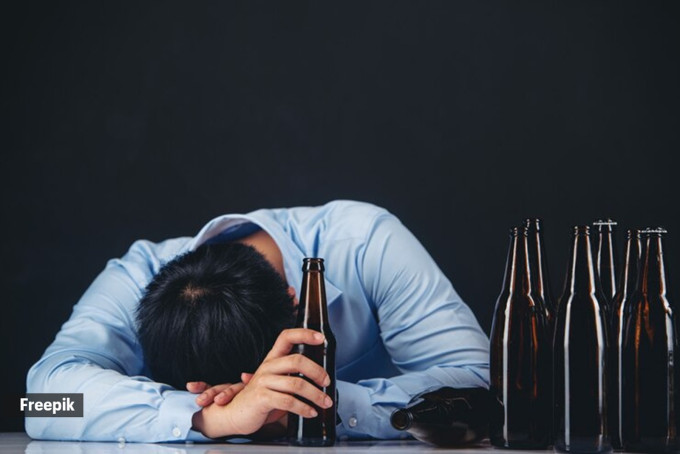‘I was pretty high on spirits,’ Rajesh Khanna on resorting to consuming alcohol after facing career setback
Rajesh Khanna, one of Bollywood’s biggest stars during the 60s and 70s, once opened up about turning to alcohol after facing a decline in his career. He admitted that his wife, Dimple Kapadia, thought he “had gone insane” as he struggled to cope with the fading of his stardom. This interview was published in a 1990 issue of Movie magazine.
Khanna spoke about how the realisation of his immense stardom led to a change in his personality. He said, “I still remember the exact moment when for the first time I became aware of how mind-blowing super-success can be. It psyches you totally — or you’re not human.”

He then explained how failure affected him and led him to resort to consuming alcohol to cope with the setback. He said, “Later, when I started dipping, I hit the bottle. I mean, I am not a superhuman being. You are not Jesus Christ and I am not Mahatma Gandhi. I remember that once at three ‘o’clock in the morning, I was pretty high on spirits and suddenly it was too much for me to stomach because it was my first taste of failure. I remember that once at three o’clock in the morning I was pretty high on spirits and suddenly it was too much for me to stomach because it was my first taste of failure. One after another, seven films had just flopped in a row. It was raining, pitch-dark and up there alone on my terrace, I lost control. I yelled out. Parvardigar, hum garibon ka itna sakt intihaan na Ie ki hum tere vajood ko inkar kar de,’ (Don’t test my patience to such an extent that I question your very existence).”
“Of course, Dimple and my staff came running, thinking that I had gone insane,” he added.
For many, professional setbacks can feel like a personal failure, leading them to seek solace in alcohol. But why do some individuals turn to drinking when their careers take a downturn?
Malika Chandra, psychotherapist at MC Psychotherapy, says, “For most of us, our career becomes attached to our sense of self and worth. This could make a career setback feel like a decrease in self worth and trigger feelings of inadequacy. One of the factors that could make this more likely is the absence of other factors in life that also contribute significantly to self-worth. Secondly, some people are more prone than others to use alcohol as a coping mechanism. The social acceptance of alcohol also makes it more likely to be consumed as a coping drug, without ringing alarm bells initially.”
 Find alternative ways to find your self worth other than just your career. (Source: Freepik)
Find alternative ways to find your self worth other than just your career. (Source: Freepik)
How does alcohol consumption provide a temporary relief from feelings of inadequacy or failure?
Alcohol provides temporary release by engaging dopamine and serotonin levels in the body. This makes a person feel happy and less anxious. It also reduces their inhibitions temporarily. This short lived state offers instant relief from unpleasant feelings. For a person struggling with such feelings, especially those that are likely to avoid feeling their feelings, alcohol gives them what they think they need, says Chandra.
However, the effects wear off quickly, she reveals. As soon as this happens, you now become more anxious and even less happier than you were before drinking. It’s almost as if the positive momentary feelings were borrowed from a future version of yourself. “This is the tricky stage where some people drink even more alcohol, since they remember the temporary relief it provided. This leads to a cycle of needing to drink more and more and eventually becoming addicted. Over time, your natural capacity to become happy and to reduce your own anxiety is reduced.”
Healthier coping mechanisms for individuals who find themselves struggling with professional setbacks
Here are some strategies recommended by Chandra:
– As much as you would like to avoid unpleasant feelings, feeling them is the only way out. The more you engage in unhealthy coping mechanisms, the more work you will have to do to get back to feeling them eventually. Understanding this idea can help engage in healthier coping mechanisms.
– Do not be afraid to ask for help. It may be difficult to be vulnerable, but seeking help from friends and family can help restore relationships and be very effective in reducing the likelihood of alcohol consumption.
– Addiction therapy can be helpful in understanding the deeper patterns of why alcohol seems like a good escape to you. It can also help replace these urges with healthier patterns.
– Find alternative ways to find your self worth other than just your career. This may also include other aspects of your career that are currently going well.
– While it may not come naturally initially, try to choose a hobby that is interesting to you as well as challenging enough. It may seem impossible to find the motivation and you may feel like it won’t help, but almost forcing yourself to do this is likely to in turn influence how you feel.
– Identify the feelings and triggers that occur just before you feel like drinking alcohol. Use these to effectively replace alcohol with healthier coping mechanisms.
📣 For more lifestyle news, click here to join our WhatsApp Channel and also follow us on Instagram
Disclaimer: The copyright of this article belongs to the original author. Reposting this article is solely for the purpose of information dissemination and does not constitute any investment advice. If there is any infringement, please contact us immediately. We will make corrections or deletions as necessary. Thank you.
